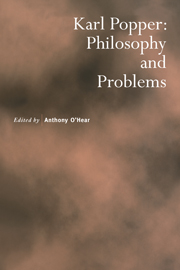Book contents
- Frontmatter
- Contents
- Introduction
- Popper, Science and Rationality
- Popper and Reliabilism
- The Problem of the Empirical Basis
- ‘Revolution in Permanence’: Popper on Theory-Change in Science
- Popper's Contribution to the Philosophy of Probability
- Propensities and Indeterminism
- Popper on Determinism
- Popper and the Quantum Theory
- The Uses of Karl Popper
- Popper and Darwinism
- Popper and the Scepticism of Evolutionary Epistemology, or, What Were Human Beings Made For?
- Does Popper Explain Historical Explanation?
- The Grounds for Anti-Historicism
- What Use is Popper to a Politician?
- Ethical Foundations of Popper's Philosophy
- Works of Karl Popper Referred to in the Text
- Notes on Contributors
- Index
Popper and the Quantum Theory
Published online by Cambridge University Press: 19 January 2010
- Frontmatter
- Contents
- Introduction
- Popper, Science and Rationality
- Popper and Reliabilism
- The Problem of the Empirical Basis
- ‘Revolution in Permanence’: Popper on Theory-Change in Science
- Popper's Contribution to the Philosophy of Probability
- Propensities and Indeterminism
- Popper on Determinism
- Popper and the Quantum Theory
- The Uses of Karl Popper
- Popper and Darwinism
- Popper and the Scepticism of Evolutionary Epistemology, or, What Were Human Beings Made For?
- Does Popper Explain Historical Explanation?
- The Grounds for Anti-Historicism
- What Use is Popper to a Politician?
- Ethical Foundations of Popper's Philosophy
- Works of Karl Popper Referred to in the Text
- Notes on Contributors
- Index
Summary
Popper wrote extensively on the quantum theory. In Logic der Forschung (LSD) he devoted a whole chapter to the topic, while the whole of Volume 3 of the Postscript to the Logic of Scientific Discovery is devoted to the quantum theory. This volume entitled Quantum Theory and the Schism in Physics (QTSP) incorporated a famous earlier essay, ‘Quantum Mechanics without “the Observer”’ (QM). In addition Popper's development of the propensity interpretation of probability was much influenced by his views on the rôle of probability in quantum theory, and he also wrote an insightful critique of the 1936 paper of Birkhoff and von Neumann on nondistributive quantum logic (BNIQM).
In this paper I will look at some of Popper's arguments in a suitably critical spirit. But he would have applauded this. My great regret is that he cannot respond to this paper with criticisms of my arguments!
Thought Experiments
In 1934 Popper published a short note in Die Naturwissenschaften entitled ‘Zur Kritik der Ungenauigkeitsrelationen’ (KU). This was actually Popper's scientific debut. It contained what Popper later described as ‘a gross mistake for which I have been deeply sorry and ashamed ever since’ (QTSP, p. 15). Appendix *XII to the 1959 translation of LSD reproduces a letter from Einstein written in 1935 criticising Popper's proposed thought experiment. Although he tells us in his autobiography (UQ, p. 92) that he defended his experiment against von Weiszäcker and Heisenberg, he immediately concurred with Einstein's criticism.
- Type
- Chapter
- Information
- Karl PopperPhilosophy and Problems, pp. 163 - 176Publisher: Cambridge University PressPrint publication year: 1996
- 1
- Cited by

